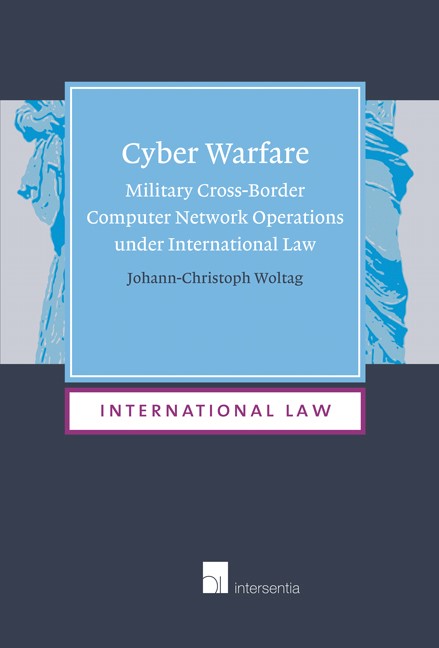Book contents
- Frontmatter
- Dedication
- Acknowledgements
- Contents
- Abbreviations
- Introduction
- PART I THE INTERNET AS A UNIVERSAL YET TERRITORIALISED INFRASTRUCTURE
- Chapter 1 A Survey of Computer Network Operations
- Chapter 2 The Legal Regime of Cyberspace
- PART II THE LEGAL QUALIFICATION OF COMPUTER NETWORK OPERATIONS
- PART III CONCLUSION
- Bibliography
Chapter 2 - The Legal Regime of Cyberspace
from PART I - THE INTERNET AS A UNIVERSAL YET TERRITORIALISED INFRASTRUCTURE
Published online by Cambridge University Press: 28 November 2017
- Frontmatter
- Dedication
- Acknowledgements
- Contents
- Abbreviations
- Introduction
- PART I THE INTERNET AS A UNIVERSAL YET TERRITORIALISED INFRASTRUCTURE
- Chapter 1 A Survey of Computer Network Operations
- Chapter 2 The Legal Regime of Cyberspace
- PART II THE LEGAL QUALIFICATION OF COMPUTER NETWORK OPERATIONS
- PART III CONCLUSION
- Bibliography
Summary
From the perspective of international law, the starting point in any legal evaluation of military computer network operations is the question of the regime applicable thereto. What all computer network operations have in common is their underlying technology, which in most cases will in one way or another utilise the public Internet, the technical background of which has been outlined above. Based on these findings, the intention is to analyse to what extent a legal regime has been developed that applies to conduct on the Internet.
Such a regime need not necessarily be introduced specifically for the Internet as from the outset it is clear that there is no such thing as an ‘International Convention on the Internet’. However, also in the case of the law of the sea or space law, both of which have more or less widely ratified treaty regimes and a considerable amount of established customary international law, the territorial sovereignty of States has even from the outset diminished the geographical scope of the area available for regulation. General international law therefore might already have carved out certain core elements of an Internet regime.
JURISDICTION IN CYBERSPACE
In order to be able to qualify the legality of computer network operations by States it must first be analysed in what way the jurisdiction of States is manifested in cyberspace as a fundamental feature of sovereignty. This is of particular concern as until now the question has not been settled comprehensively.
CYBERSPACE AS A JURISDICTION SUI GENERIS
Especially at the start of the Internet's spread in the 1990s, it was a widespread view that cyberspace constitutes a sphere sui generis, outside both of State authority and legal regulations. This view is exemplified by statements describing cyberspace as an intangible virtual world or ‘an abstract reality of ideas, information, and logic’. ‘Netiquette’ was widely claimed to be able to provide a high level of self-government for this space by the Internet users themselves. Others put forward propositions aimed at adopting an international framework for cyberspace including the establishment of a corresponding international organisation. This somewhat idealistic understanding of the Internet was nonetheless quickly recognised to be a myth as soon as Internet use spread beyond its beginnings as a military and academic undertaking and into everyday life.
- Type
- Chapter
- Information
- Cyber WarfareMilitary Cross-Border Computer Network Operations under International Law, pp. 53 - 82Publisher: IntersentiaPrint publication year: 2014

